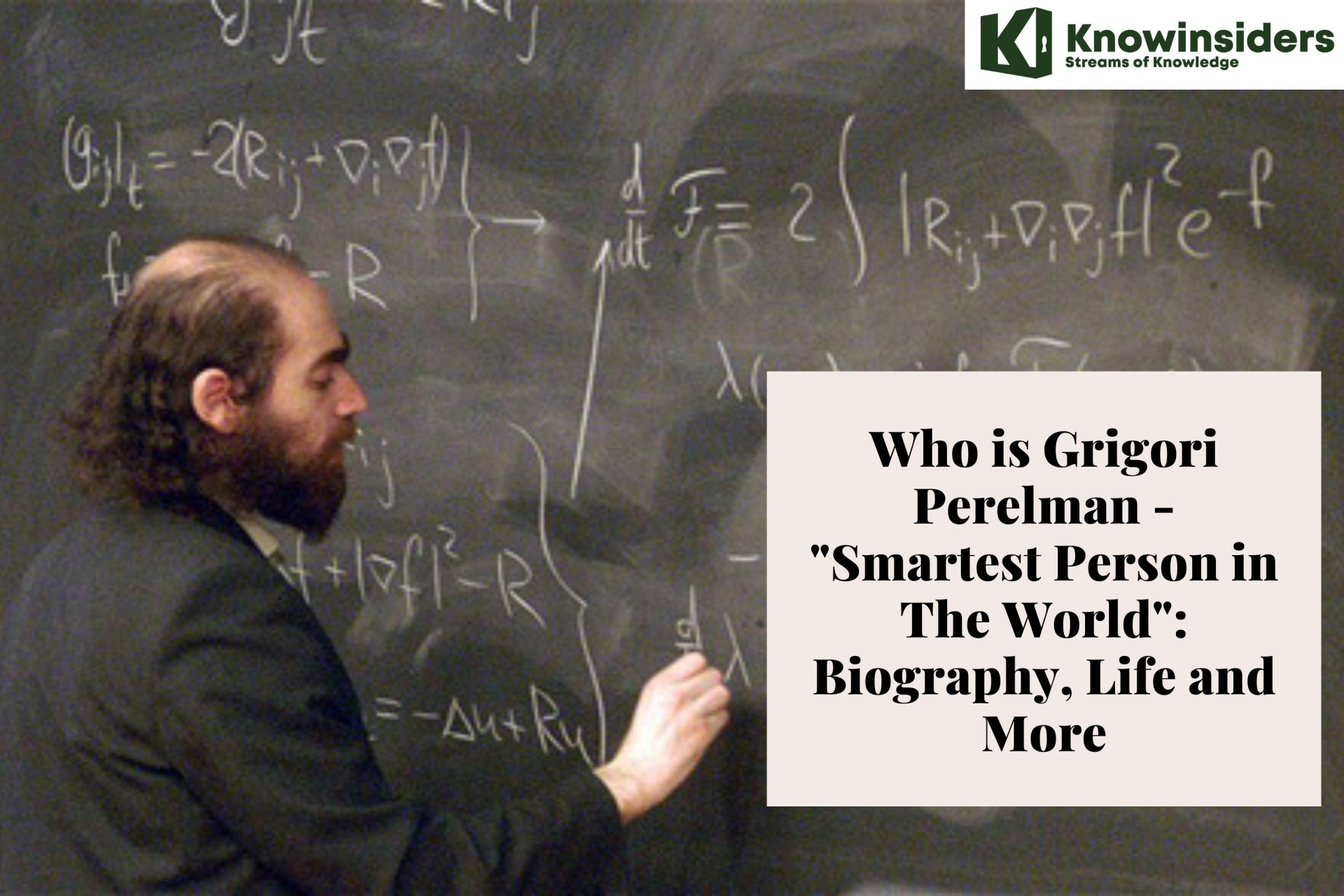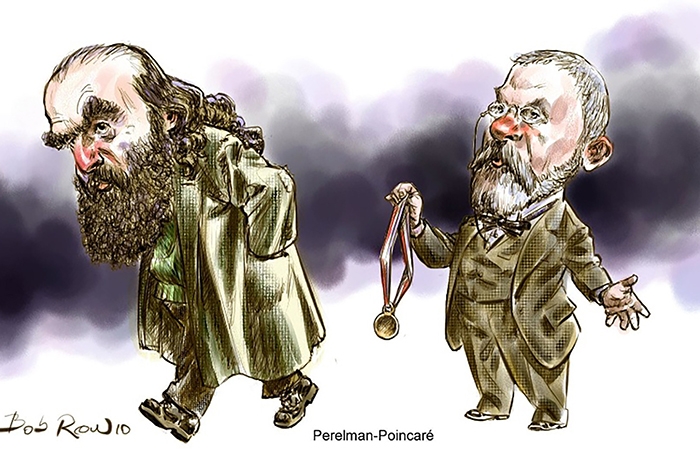Who is Grigori Perelman - "World's Smartest Person": Biography, Personal Life and More
 |
| Who is Grigori Perelman - "Smartest Person in The World": Biography, Life and More |
| Summary |
Dubbed the "genius brain of mankind", who has solved the most mysterious and difficult problem of the century - the problem of the Poincaré conjecture, contributing to revealing the structure of the universe, the mathematician Russian scholar Grigori Perelman refused all the glory and money bestowed upon him.
He severed all ties with society to lock himself in an old shabby apartment on the outskirts of Saint-Pétersbourg. Who is and how is he now? Read on to know more about him!
Grigori Perelman's Biography: Early Life and Family
Grigori Yakovlevich Perelman's parents are Yakov Perelman, an electrical engineer, and Lubov Lvovna, who was a teacher of mathematics at a technical college. They were Jewish, which would present their son with some problems in a country where it was feared that those of Jewish descent had divided loyalty. Grigori Yakovlevich, their first child, is often known by the name Grisha. As a young child, Grisha was taught to play the violin both by his mother and by a private tutor. His father also had a major influence in developing his son's problem-solving skills.His mother also helped develop his mathematical skills and, by the time he was ten, he had taken part in district mathematics competitions and shown a marked talent. Lubov sought advice about how best to develop Grisha's mathematical talents and was advised to send him to a mathematics club run by a nineteen-year-old coach named Sergei Rukshin. The club met twice a week at the Palace of Pioneers at the end of the school day and Rukshin, an undergraduate student at Leningrad University, had some novel ways of getting the best out of the boys who came to the club.
Perelman has a sibling, Elena who is his younger sister. She is a scientist with a Ph.D. from Weizmann Institute of Science (Israel). It is now said that Perelman has retired from the field of mathematics, as of 2003 he stopped working at Steklov Institute. Many people believe that it is due to the superficial leanings in the Mathematical world, and have labelled his isolation on that particular reason. Additionally Perelman has tried to avoid journalists and has also expressed his dislike for awards and prizes which carry financial value.
Math Genius
At the 5th grade, Grigori Perelman began to participate in seminars at the Leningrad Children's Palace Math Center, founded by the leading expert in the natural sciences, Professor Sergei Rukshin.
In the 9th grade, G.Perelman transferred to the 239 math-physics high school on the outskirts of the city. Although the school is far from home, it can satisfy his passion for mathematics.
At the age of 16, G.Perelman was one of six members of the Soviet team participating in the 23rd International Mathematical Olympiad (IMO) held in Budapest (Hungary) in 1982, and won a gold medal with points. absolute number 42/42.
After returning home, G. Perelman was given special permission to study at Leningrad State University (LGU). With excellent academic performance, G. Perelman received a full scholarship named 'Lenin' to transfer to a PhD student.
After graduating with a PhD degree from LGU's Department of Mechanical Mathematics, specializing in the study of the shape of objects in space, G. Perelman took a job at the Leningrad Branch of the Steklov Institute of Advanced Mathematics ( LOMI, now PDMI) famous.
Achievements and Contributions
• 1991 - Prize "Young Mathematician" of the St. Petersburg Mathematical Society
• 1996 - European Mathematical Society Prize for Young Mathematicians
• 2006 - Fields Medal Award
• 2010 - Clay Institute of Mathematics Award
Due to his contribution of “Aleksandrov’s spaces of curvature bounded from below” he won the Young Mathematician Prize of the St. Petersburg Mathematical Society in 1991. In 1993 he was offered a Miller Research Fellowship at the University of California, Berkeley which lasted two years. Perelman proved the ‘soul conjecture’ in 1994 which led to job offers from many top universities in the United States of America which also included Princeton and Stanford. However, he turned down all the tempting offers and went to Steklov Institute in Saint Petersburg for a research position in 1995.
He is also known for proving Thurston’s geometrization conjecture in 2002. He was awarded the Fields Medal in 2006, but he rejected it saying “I’m not interested in money or fame, I don’t want to be on display like an animal in a zoo”. Perelman also declined the Millennium Prize in 2006.
With his mathematical contributions, he was invited to different institutes to speak and his work has been explained by various authors in Journals.
The Journal ‘Science’ acknowledged Perelman’s proof of the Poincaré conjecture as a “Breakthrough of the Year”, which was one of its kind at that time. This suggests that Perelman had unfolded a significant turning in the world of Mathematics.
An illustrious career, but always wants to stay hidden
 |
| Photo: -laureate-forum |
Throughout his career, the Russian mathematical genius received many invitations to lecture and teach at many top American universities. He agreed, but refused to stay for a long time because his life was devoted to research. G. Perelman returned to his hometown and continued to work at LOMI with a burning passion for research. During his work here, the young scientist's first controversial action was that he refused to defend his doctoral thesis proposed by his colleagues.
In 1996, G. Perelman was awarded the European Mathematical Union's (EMS) Young Mathematician Prize, but he declined it Not long after, the International Mathematical Union (IMU) based in Berlin (Germany) decided to award the Fields Medal - the noble prize known as the "Nobel Prize in Mathematics" to G. Perelman but he refused to go to Spain to receive the prize.
At the beginning of 2010, the Clay Mathematics Institute (CMI) - a non-profit organization based in the city of Cambridge (Massachusetts, USA) - agreed to award the Millennium Prize with a reward of $ 1 million to the developer. Russian mathematician G. Perelman for proving the Poincar Conjecture. But like the previous international award, this time he continued to decline.
The only time Grigori accepted the prize was in 1991. That year he was awarded the Leningrad Young Mathematical Society's prize for his contributions to the field of professional research.
Explaining the reason for being indifferent to the series of awards/bonuses, Grigori said: "I already have everything I want, so I don't care about money or fame!".
How Perelman was awarded the Clay Award
So, in March 2010, Perelman was awarded the well-deserved award. The prize in mathematics meant receiving an impressive fortune, the size of which was $ 1 million. Grigory Yakovlevich was supposed to receive it for the proof. However, in June 2010, the scientist ignored the mathematical conference held in Paris, at which this award was to be presented. And on July 1, 2010, Perelman announced his refusal publicly. Moreover, he never took the money allotted to him, despite all the requests.
Why did Grigori refuse Clay Millennium Prize?
Grigori Perelman refused the prestigious and the first Clay Millennium Prize of $1 Million because he was not happy with the Mathematical Community and how it worked. There are several events that lead to his refusal.
Initially, before publishing the proof to Poincare Conjecture, Grigori received little to no recognition and even, Mathematicians refused to collaborate or discuss with him and other Mathematicians.
He realized that Mathematicians are more focused on making a discovery for personal credit than on collaborating and taking the entire field forward. Mathematicians are more focused on Monetary resources.
Grigori had said years before that he will solve the Poincare Conjecture but no one gave him any attention. Later, when he did publish a proof, the scientific community's first reaction was to claim that it was another wrong proof without taking any look.
This saddens Grigori that the community is not taking new ideas seriously.
Later, when it was determined that his proof is in fact correct, things changed suddenly. He had job offers from several prestigious Universities, Mathematicians wanting to collaborate, invitations for talks, and many more.
He was disappointed for the evil efforts of the Fields medalist, Shing-Tung Yau to downplay Perelman's role in the proof and promote the work of Cao and Zhu towards solving the conjecture. Though the efforts failed, no one took any action.
Grigori said that the community should give half of his credit to Richard S. Hamilton who is the inventor of Ricci Flow as Ricci Flow was the foundation of the proof. Even Hamilton was not happy that Grigori used his tool to make such a ground-breaking discovery and he, himself, could not do it.
The community refused to give credit to Hamilton.
All these lead to Grigori's refusal to accept the Clay Millenium Prize and the Field's Medal.
Though he refused the prizes, he did a World Tour following his discovery and gave talks at several prestigious Universities like MIT. Following a few months of the Tour, he stopped making public appearances again.
Other awards refused by Grigory Perelman
By the way, in 1996 Grigory Yakovlevich was awarded a prestigious prize for young mathematicians from the European Mathematical Society. However, he refused to receive it.
Ten years later, in 2006, the scientist was awarded the Fields Medal for solving the Poincare conjecture. Grigory Yakovlevich also refused her.
The journal Science in 2006 called the proof of the hypothesis created by Poincaré the scientific breakthrough of the year. It should be noted that this is the first work in the field of mathematics that has earned such a title.
David Gruber and Sylvia Nazar published an article in 2006 called Manifold Destiny. It talks about Perelman, about his solution to the Poincaré problem. In addition, the article tells about the mathematical community and the ethical principles that exist in science. It also features a rare interview with Perelman. Much is also said about the criticism of Yau Xingtang, the Chinese mathematician. Together with his students, he tried to challenge the completeness of the evidence presented by Grigory Yakovlevich. In an interview, Perelman noted: "Those who violate ethical standards in science are not considered outsiders. People like me are who are isolated."
In September 2011, the mathematician Perelman also refused membership in the Russian Academy of Sciences. His biography is presented in a book published in the same year. From it you can learn more about the fate of this mathematician, although the information collected is based on the testimony of third parties. Its author - The book was compiled on the basis of interviews with classmates, teachers, colleagues and colleagues of Perelman. Sergei Rukshin, Grigory Yakovlevich's teacher, spoke critically of her.
Grigori Quotes
 |
| Photo: thuvienkhoahoc |
I know how to control the universe. And tell me - why should I run for a million?
The whole world is permeated by emptiness, and it obeys formulas - this gives us limitless possibilities.
If you can train your arms and legs, then why not train your brain?
There is no such thing as an unsolvable problem. Difficult to solve. So more precisely.
Remember the biblical legend about how Jesus Christ walked on water, like dry land? So I had to calculate how fast he had to move through the waters so as not to fall through.
Grigori Facts and Trivia
• While working in the States, the scientist surprised his foreign colleagues with his unpretentiousness and detachment from everyday needs. The favorite food of the mathematician was sandwiched with cheese, which Grigory Yakovlevich washed down with kefir or milk. Restaurants and an abundance of grocery stores did not interest the "strange Russian".
• As a child, Gregory was fond of music. Mother instilled in her son the adoration of classical composers. She, being a talented violinist, introduced Grisha to the instrument. Perelman attended music school with pleasure, and then he faced a difficult choice - to enter the conservatory or to devote himself to the exact sciences.
• Statements by conspiracy theorists have appeared on the Web that Perelman is the most powerful person on earth because he knows how to control the universe. Of course, such a person did not escape the attention of the secret services, and communication with others is prohibited for a scientist.
How and Where Does He Live Now?Several years ago, information appeared that Perelman moved to Sweden – but the version according to which he goes there to collaborate with scientists looks more reliable, because his younger sister lives there, who also made a career as a mathematician, and continues to care for his sick mother in St. Petersburg. They live poorly. Their father emigrated to Israel in the early 90s, the mother and children then stayed in St. Petersburg. Now, according to rumors, the mathematician still lives in the same apartment of the merchant. Few online photos, where Perelman was photographed outside his house, show a man in a jacket opening the front door of an ordinary high-rise building. |
 Who Is Xiao Zhan - World’s Most Handsome Man 2022 by Global Survey Who Is Xiao Zhan - World’s Most Handsome Man 2022 by Global Survey Xiao Zhan (Chinese) Confirmed As World’s Most Handsome Man 2022. Find out the biography, personal life, career of Xiao Zhan. |
 Who is Sophie Grégoire Trudeau: Biography, Personal Life, Career and Net Worth Who is Sophie Grégoire Trudeau: Biography, Personal Life, Career and Net Worth Sophie Grégoire Trudeau's biography: Who is Sophie Grégoire Trudeau, the wife of Justin Trudeau, the woman who made a big contribution to her husband's career? |
 Who is Nicole Shanahan: Biography, Personal Life, Career and Net Worth Who is Nicole Shanahan: Biography, Personal Life, Career and Net Worth Elon Musk had an affair with Nicole Shanahan, wife of Google co-founder Sergey Brin. Find out the biography, personal profile, love affairs, career and net ... |























